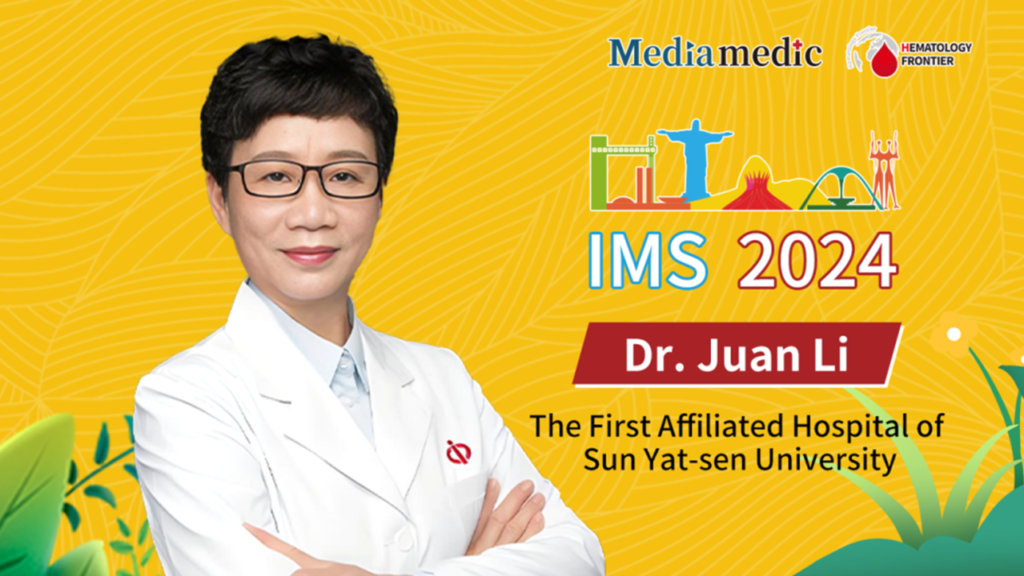
From September 25 to 28, 2024, the 21st International Myeloma Society (IMS) Annual Meeting was held in Rio de Janeiro, Brazil. At this prestigious conference, the research led by Dr. Juan Li from The First Affiliated Hospital of Sun Yat-sen University in China was selected for poster presentation. The study suggests that for high-risk multiple myeloma (MM) patients with dual hits of 1q21 amplification and t(4;14), tandem autologous stem cell transplantation (Tandem ASCT) might be an effective treatment strategy. Hematology Frontier invited Professor Li to share the findings of this study and its clinical significance.New Drug Sequential Autologous Stem Cell Transplantation (ASCT) Combined with Tandem ASCT for High-Risk Multiple Myeloma (MM) Patients Shows Promising Efficacy
This prospective, multi-center clinical study enrolled 30 patients with high-risk cytogenetic features who underwent tandem ASCT and compared them with 56 patients who received a single ASCT. The results indicated a significant improvement in time to progression (TTP) for the tandem ASCT group, although there was no marked difference in overall survival (OS). Notably, for patients with dual hits of 1q21 amplification and t(4;14), tandem ASCT showed a trend toward improved TTP, suggesting that this strategy might provide a new treatment option for these high-risk patients and help improve their prognosis.
Dr. Juan Li: “In the field of multiple myeloma treatment, autologous stem cell transplantation has become a standard approach. However, for patients with high-risk cytogenetic features, especially those with dual hits, single autologous transplantation remains challenging. Our study explored the potential value of tandem autologous stem cell transplantation for these patients,” said Professor Li. “Through our in-depth analysis, we discovered that for patients with dual hits of 1q21 amplification and t(4;14), the tandem transplant strategy might offer additional survival benefits. This could help identify the high-risk patients who are most likely to benefit from tandem transplantation and provide them with personalized treatment recommendations. Our findings provide valuable information for the design of future clinical trials, and we look forward to further studies to validate these preliminary findings and ultimately improve treatment outcomes for these patients.”
Dr. Juan Li
- Senior Professor, Chief Physician, and Doctoral Supervisor at Sun Yat-sen University
- Director of the Institute of Hematology, Sun Yat-sen University
- Head of the Hematology Department at The First Affiliated Hospital of Sun Yat-sen University
- Former Chair of the Hematology Physician Branch of Guangdong Medical Association
- Chair of the Hematology Professional Committee, Guangdong Health Management Association
- Vice President of the Hematology Physician Branch of the Chinese Medical Doctor Association and Vice Chair of the Multiple Myeloma Professional Committee
- Executive Member of the Hematology Branch of the Chinese Medical Association and Head of the Plasma Cell Disease Group
- Vice Chair of the Hematology Committees of multiple Chinese and cross-strait medical associations
- Member of the International Myeloma Society and Asian Myeloma Network
- Principal Investigator of over 20 funded projects, including the National Natural Science Foundation of China, and author or corresponding author of over 200 published papers, including more than 90 SCI-indexed papers. Winner of several awards, including the First and Third Prizes of Guangdong Provincial Science and Technology Progress Awards and the Second Prize of the Huaxia Medical Science Award. Editor-in-chief of eight monographs.
First Author
Dr. Beihui Huang
- Associate Chief Physician at the Hematology Department, First Affiliated Hospital of Sun Yat-sen University
- Executive Member and Secretary of the Hematology Professional Committee, Guangdong Health Management Association
- Member and Secretary of the Hematology Physician Branch of Guangdong Medical Association
- Member of the Plasma Cell Disease Group, Hematology Branch of the Chinese Medical Association
- Member of the Hematology Branch of the Chinese Society of Geriatrics
This comprehensive study highlights the promising role of tandem ASCT in high-risk multiple myeloma patients and provides a foundation for future research in personalized treatment strategies for these challenging cases.


